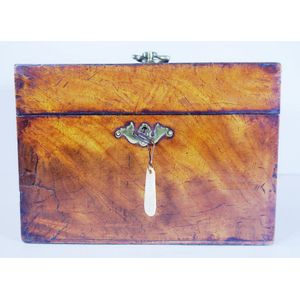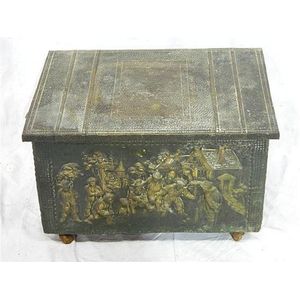Victorian Burr Walnut Writing Box
A Victorian burr walnut and shell inlaid writing box, circa 1880s, with Mother-of-pearl and abalone inlay to the curved lid and escutcheon opening to the original violet velvet writing plane with a tooled surround, and having trays for pens and brass capped ink bottles; with key. Height 17 cm. Length 35 cm. Width 25 cm
You must be a subscriber, and be logged in to view price and dealer details.
Subscribe Now to view actual auction price for this item
When you subscribe, you have the option of setting the currency in which to display prices to $Au, $US, $NZ or Stg.
This item has been sold, and the description, image and price are for reference purposes only.
- Circa - A Latin term meaning 'about', often used in the antique trade to give an approximate date for the piece, usually considered to be five years on either side of the circa year. Thus, circa 1900 means the piece was made about 1900, probably between 1895 and 1905. The expression is sometimes abbreviated to c.1900.
- Victorian Period - The Victorian period of furniture and decorative arts design covers the reign of Queen Victoria from 1837 to 1901. There was not one dominant style of furniture in the Victorian period. Designers used and modified many historical styles such as Gothic, Tudor, Elizabethan, English Rococo, Neoclassical and others, although use of some styles, such as English Rococo and Gothic tended to dominate the furniture manufacture of the period.
The Victorian period was preceded by the Regency and William IV periods, and followed by the Edwardian period, named for Edward VII (1841 ? 1910) who was King of the United Kingdom and the British Dominions and Emperor of India for the brief period from 1901 until his death in 1910. - Burr - Burr (or in the USA, burl) is the timber from the knotted roots or deformed branch of the tree, which when cut, displays the small circular knots in various gradations of colour. It is always cut into a decorative veneer, most commonly seen as burr walnut on 19th century furniture.
- Mother-Of-Pearl - Mother-of-pearl, technical name "nacre", is the inner layer of a sea shell. The iridescent colours and strength of this material were widely used in the nineteenth century as an inlay in jewellery, furniture, (especially papier mache furniture) and musical instruments.
In the early 1900s it was used to make pearl buttons. Mother-of-pearl is a soft material that is easily cut or engraved.
Nowadays it is a by-product of the oyster, freshwater pearl mussel and abalone industries.
This item has been included into following indexes:
Visually similar items

George III Tea caddy / box flame mahogany with original axe head handle to lid, c1780
Sold by
in
for
You can display prices in $Au, $US, $NZ or Stg.

Huon pine lift top work box with carved top
Sold by
in
for
You can display prices in $Au, $US, $NZ or Stg.

Sold by
in
for
You can display prices in $Au, $US, $NZ or Stg.

A Regency mahogany and fruitwood tea caddy with batwing-fluted oval paterae; fitted interior with single lidded compartment. Width 10.5 cm
Sold by
in
for
You can display prices in $Au, $US, $NZ or Stg.
